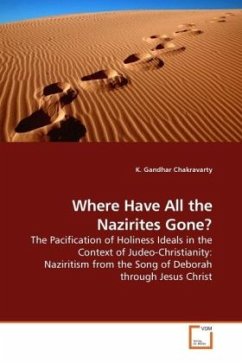Through the diametrically opposed representations of nazirites (n zîrs) in the Bible, we can trace the reasons for which holiness ideals were pacified in the context of Judeo-Christianity. Two models of biblical naziritism exist: tribal and cultic. The tribal n zîr is a lifelong warrior who is consecrated in the womb and must never cut their hair or drink wine. The cultic n zîr, however, engages in a temporary vow in which a priest consecrates them and they must also avoid dead bodies. To explain: when the Israelites represented a series of tribes in Caanan, religious heroes had to be warriors, but as the political circumstances of Israel and Judah variously evolved, the priestly ruling class had to make amendments to holiness ideals in order to discourage violence, as both civic and foreign policy. The movement away from holy warrior shifts further until the incarnation of the holy person in early Christianity, as embodied in the overarching model of Jesus Christ, is far from militaristic the battle of good versus evil thus faded from the battlegrounds of the fertile crescent to an inward spiritual struggle in the context of Ancient Near Eastern Judeo-Christianity.






